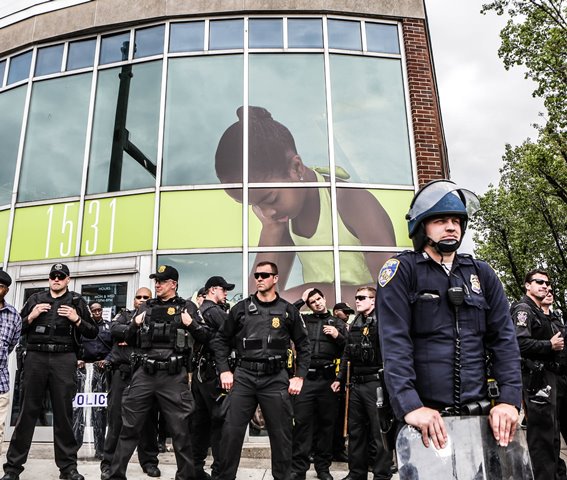Neither heavy rain nor a new Justice Department’s skepticism stopped dozens of Baltimore residents from converging on a downtown federal courthouse Thursday to voice their support for putting the city’s police department under federal review.
President Barack Obama’s Justice Department investigated the Baltimore police following the death of Freddie Gray and issued a report saying black residents were subject to disproportionate rates of stops, searches and arrests. It also found a pattern of excessive force against juveniles and those with mental health issues, and it determined that the city’s police “seriously and systematically” under-investigated sexual assault cases.
It issued a consent decree focused on sweeping reforms, but earlier this week, Attorney General Jeff Sessions — the head of President Donald Trump’s Justice Department and a longtime critic of consent decrees — ordered a review of his department’s police reform efforts, according to a memorandum.
John Gore, representing the Justice Department, had attempted and failed to delay the hearing. He told U.S. District Judge James Bredar that Sessions had “grave concerns” about the agreement.
Though there were exceptions, most of the 49 speakers who followed told the court they disagreed with Gore during the 3 minutes allotted for each to speak. Here is what some of them had to say:
‘We are hurting’
Greta Carter-Willis V’s hands trembled and her voice cracked as she recounted August 2006, when, she says, she watched a Baltimore officer fatally shoot her 14-year-old son.
“He came into my home, took my son’s life unjustly,” she said. “We are hurting. We appreciate the Department of Justice coming, but we live through this on a daily basis. … I welcome this consent decree because it is a step in a positive direction. … We need reform within this city, especially within the part of use of force — to deescalate, not to escalate a situation.”
Frightful game of pretend
Rebecca Shillen said she recently saw a group of neighborhood kids playing cops and robbers in the street. One child threw another on a parked car and shouted, “Put your hands on the back of the car or I’ll kill you,” she recounted.
“I don’t want to see all the little boys and girls on my street have to grow up to have that reality,” she said, imploring the judge to move forward with the consent decree for the sake of her family.
Scared of the wrong thing
Tracie Guy-Decker, another Baltimore mother, said that she was afraid to call the police.
“I’m afraid the consequences are worse when the police are present and that’s not healthy for me and my family,” she said, also supporting the consent decree.
‘This is, in fact, somewhere’
“Justice delayed is justice denied,” said Kevin Parson, invoking the words of the Rev. Martin Luther King Jr. to criticize the Department of Justice’s attempt to delay the decree.
“The decree may not be what some people want, but it is a good faith step in the right direction,” he said.
He singled out the training requirements, especially those aimed at improving interactions with the mentally ill and homeless, as an important facet.
“Trust must be restored,” he said. “It takes years to build trust, seconds to break trust and sometimes forever to repair trust. But I humbly feel that we must begin somewhere. This is, in fact, somewhere.”
‘So-called reforms’
Vincent Robinson, a deacon at God for New Ministries, said he applauded the Department of Justice’s request to delay passage of the agreement.
“I hope that you see fit that we do something not to cover up or protect the police department through so-called reforms,” he said.
Can we just talk first?
Kenji Scott, a longtime community activist, asked the court to delay the implementation of the consent decree.
“What’s missing from it is a conversation that did not happen,” he said. “Black men like myself and street-level police officers have been left out of this conversation. If we are real about it, we’ll have some real conversation and not just throw it together.”
‘An identity already created for us’
Isaac Wilson, a student at Frederick Douglas High School, whose students allegedly were involved in the riots over Freddie Gray’s death two years ago, called his city a “steaming tea kettle.” Being discriminated against is a burden, he said. He urged the judge to OK the consent decree.
“We were born into this world with an identity already created for us,” he said. “It’s sad that it had to come to violence for the voice of the citizens to be heard.”
Victims, not criminals
Another high schooler, Shane-jah McCaffity, said she has seen videos of Baltimore police abusing their authority. She has also read and analyzed the consent decree over the past few months.
“The consent decree needs to be passed for us to feel that we can call on the (Baltimore police) without them making us the criminals when we are the victims,” she said.
Facelift only
“The current proposed consent decree is little more than a cosmetic change,” said Brandon Walker of the Ujima People’s Progress Party said.
‘An accurate picture’
David Rocah urged the judge — both as a resident and as a representative of the ACLU of Maryland to move forward with the consent decree.
“The findings letter, which was based on a thorough investigation over more than one year by career lawyers at the Department of Justice with decades of experience, paints an accurate picture of a department with significant problems as the city itself has recognized. The consent decree is a significant and necessary step to address those problems and is fair and reasonable and in the public interest,” he said.



